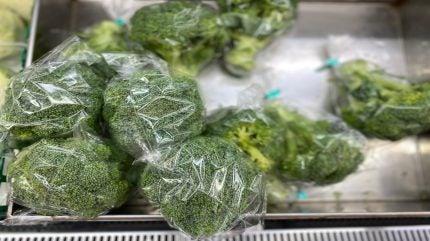
Packaging company StePacPPC has developed Xtend modified atmosphere/modified humidity (MA/MH) packaging as a sustainable solution for long-haul transportation of fresh broccoli and other vegetables, particularly in the US and Japan.
The Xtend packaging films maintain freshness through modified atmosphere and moisture control properties, which slow down respiration, inhibit ethylene, and slow microbial growth on broccoli.
In Japan, the Otofuke Agricultural Cooperative (JA Otofuke), a broccoli producer, has already experienced the benefits of the Xtend MA/MH bulk bags, claims StePacPPC.
These bags are being used to transport broccoli from Hokkaido to Yokohama, marking a departure from the traditional ice-filled polystyrene (PS) and waxed carton boxes.
The traditional PS foam boxes, although excellent insulators, pose environmental concerns due to their nonrecyclable nature and tendency to fragment, leading to persistence in the environment.
JA Otofuke Fruit and Vegetable Sales Department manager Akio Yamagishi said: “We discovered multiple benefits to iceless Xtend packaging. First, it eliminates the space ice occupies, allowing us to transport 66% more broccoli per container. This slashes carbon emissions and transport costs, especially significant given the recent rises in shipping costs.
“With ice, each box holds only 6kg of broccoli; without it, we can pack around 10kg. In addition, one Xtend bag can hold 10kg of broccoli, making it more resource-efficient and eliminating the need for extra handling. The ability to transport iceless fresh broccoli across the continent on weight-constrained trucks has led to a net reduction in costs of more than 30%.”
Xtend is also gaining traction in the US, where it is increasingly being adopted to supply fresh broccoli to the foodservice sector.
The use of iced shipments in wax-coated carton boxes is facing criticism in the US. The wax coating prevents these boxes from being recycled as paper, relegating them to general waste.
Moreover, when these boxes are landfilled, they can produce methane, a potent greenhouse gas. States such as California have even introduced local bans on nonrecyclable containers.
From a food safety perspective, the melting ice in traditional packaging can lead to microbial decay and physical hazards such as slipping.
StePacPPC CTO Gary Ward said: “At a time when flexible plastic packaging is under the spotlight, we have, together with researchers at the Agrotechnology & Food Sciences Group at Wageningen University, demonstrated that our functional ‘lean and green’ packaging solution reduces the carbon footprint by approximately 40% in shipments from Salinas Valley on the West Coast of California to New York on the East Coast, demonstrating a positive environmental impact.
“It also has proven capabilities for preserving both the quality and nutritional value of fresh broccoli during prolonged storage, extending shelf life, minimising waste, and enhancing food safety. Our Xtend bulk packaging also successfully preserves other produce traditionally shipped on ice, such as bok choy and green onions.”




